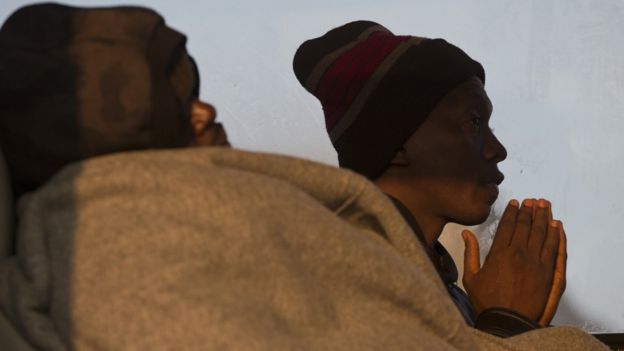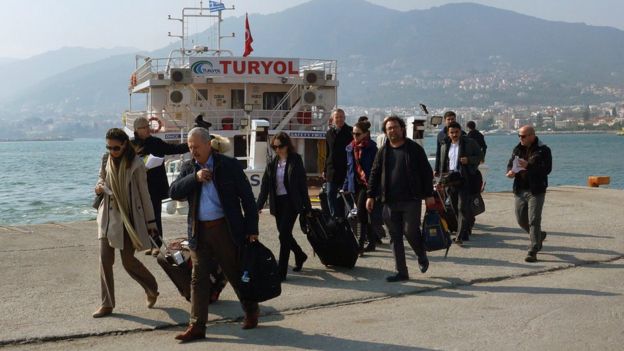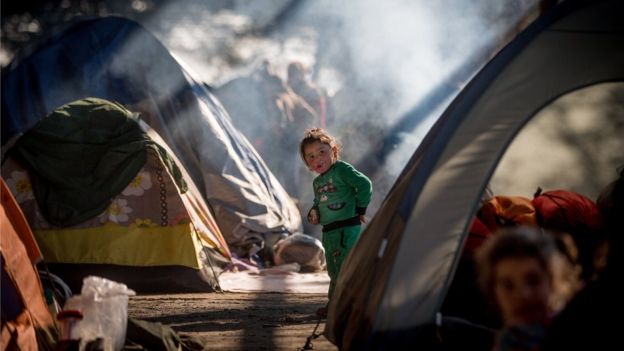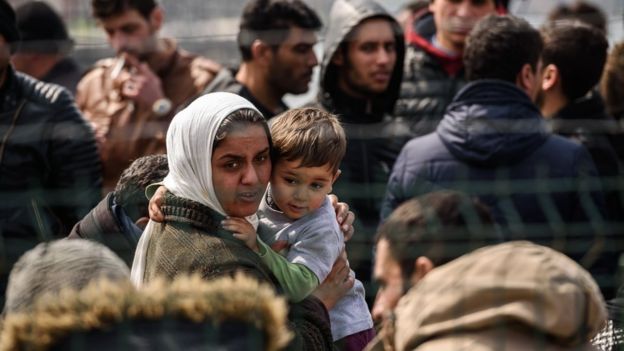Migrant crisis: Turkish monitors on Greek islands for EU deal
Migrant crisis: Turkish monitors on Greek islands for EU deal
- 21 March 2016
- Europe
Turkish observers have arrived on the Greek islands of Lesbos and Chios to oversee an EU deal on sending migrants back to Turkey.
Some 50,000 migrants are now in Greece and more arrivals have been reported.
The agreement between the EU and Turkey is aimed at halting the influx of more than a million "irregular migrants" through Greece since January last year.
Prime Minister Alexis Tsipras has said Greece faces an "uphill effort" in implementing the deal.
Boats are continuing to arrive from Turkey. More than 1,600 new migrants have reached the islands in the 36 hours since the measures came into effect on Sunday, officials say.
"If there is no reduction in the flow [of refugees], we will not be able to evacuate the islands successfully so the deal can start to be fully implemented,'' Mr Tsipras warned.
 AP
AP EPA
EPA
The arrival of the 10 Turkish monitors has aroused some political opposition in Greece. They will stay on the islands for a week.
Meanwhile, 2,300 EU experts, including security and migration officials and translators, have not yet arrived to help enforce the plan. Officials have said the returns to Turkey are unlikely to start before 4 April.
Under the deal, no new migrant arrivals will be allowed to travel to the Greek mainland.
Anyone who does not apply for asylum will be sent back, as will anyone whose claim is rejected. For every Syrian migrant sent back to Turkey, one Syrian already in Turkey will be resettled in the EU.
There are also questions about what will happen to the tens of thousands of migrants still stuck in Greece and on its closed border with Macedonia, as their route north has been blocked.
Boats carrying some 2,000 irregular migrants from the islands docked near Athens on Monday.
Key points from the agreement
 AFP
AFP- Returns: All "irregular migrants" crossing from Turkey into Greece from 20 March will be sent back. Each arrival will be individually assessed by the Greek authorities
- One-for-one: For each Syrian returned to Turkey, a Syrian migrant will be resettled in the EU. Priority will be given to those who have not tried to illegally enter the EU and the number is capped at 72,000
- Visa restrictions: Turkish nationals should have access to the Schengen passport-free zone by June. This will not apply to non-Schengen countries such as Britain
- Financial aid: The EU is to speed up the allocation of €3bn ($3.3bn; £2.3bn) in aid to Turkey to help migrants
- Turkish EU membership: Both sides agreed to "re-energise" Turkey's attempt to join the European bloc, with talks due by July
More than 144,000 irregular migrants have arrived this year alone, and about 460 have died, according to the International Organization for Migration.
Critics have said the deal could force migrants to start using other, potentially more dangerous routes, such as the journey between North Africa and Italy.
In the hours before the plan came into force, hundreds of people were rescued by Italian and Libyan officials amid an increase in traffic through the Strait of Sicily.
And in Turkey, at least 200 people were caught in a coastal town and turned back as they tried to reach Greece ahead of the deadline, authorities said.
 Getty Images
Getty Images AFP
AFP
Human rights groups have strongly criticised the deal, with Amnesty International accusing the EU of turning "its back on a global refugee crisis".
Most of the migrants arriving in Europe are keen to go to Germany and other northern countries, which have seen increasing public discontent with the influx.
Bavarian finance minister Markus Soeder - a member of the sister party of German Chancellor Angela Merkel's CDU, the Christian Social Union - has said the deal could lead to a mass migration of Kurds to Germany, as the agreement gives Turks visa-free travel rights.
"It could ultimately lead to more immigration, especially if you take visa freedom into account. Many, many Kurds fleeing the Turkish government could come to Germany," Mr Soeder told German public broadcaster ZDF.
Comments